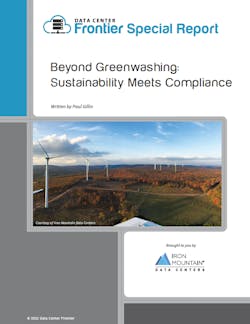Top Sustainability Metrics to Track ESG Goals and Compliance
As sustainability becomes an even higher priority for data center operators, it's crucial that they have measurable ways to track and report their progress to various stakeholders. Determining which standards and certifications to use can be challenging because the path you select will drive continuous improvement across your organization for years to come.
Beyond Greenwashing: Sustainability Meets Compliance, featuring Iron Mountain Data Centers, explores a set of metrics and mechanisms that data center operators can use track progress towards their environmental, social, and corporate governance goals, as well as evaluate and report their compliance with governmental regulations. The metrics can also be used to evaluate the performance of supply chain partners. Check out our recent article series focused on the special report:
How to Measure Data Center Sustainability: We kick off our article series by explaining why it's so critical that data center operators establish material, impactful, and measurable ways to assess their progress towards their ESG goals, and then communicate that progress to stakeholders.
A Primer on Sustainability Components and Measurements: In our second article, we outline the five basic impact areas of sustainability goals, as well as specific sustainability components and measurements. The article includes discussion of total energy consumption, power usage effectiveness (PUE), total renewable energy consumption, carbon usage effectiveness, and more.
Understanding Sustainability Standards and Regulations: Next, we take a look at key sustainability standards and regulations including five of the standards published by the International Organization for Standardization (ISO) that are most relevant to data centers. The article covers ISO 50001, ISO 9001, ISO 14001, the ISO 14060 family, and ISO 27001.
The Pros and Cons of Sustainability Certification: You can comply with an ISO standard without actually gaining certification, so is certification really necessary? We conclude our article series with a discussion of the benefits and disadvantages of getting ISO certified.
Download the entire special report, Beyond Greenwashing: Sustainability Meets Compliance, featuring Iron Mountain Data Centers to learn more.
About the Author

Kathy Hitchens
Kathy Hitchens has been writing professionally for more than 30 years. She focuses on the renewable energy, electric vehicle, utility, data center, and financial services sectors. Kathy has a BFA from the University of Arizona and a MBA from the University of Denver.



